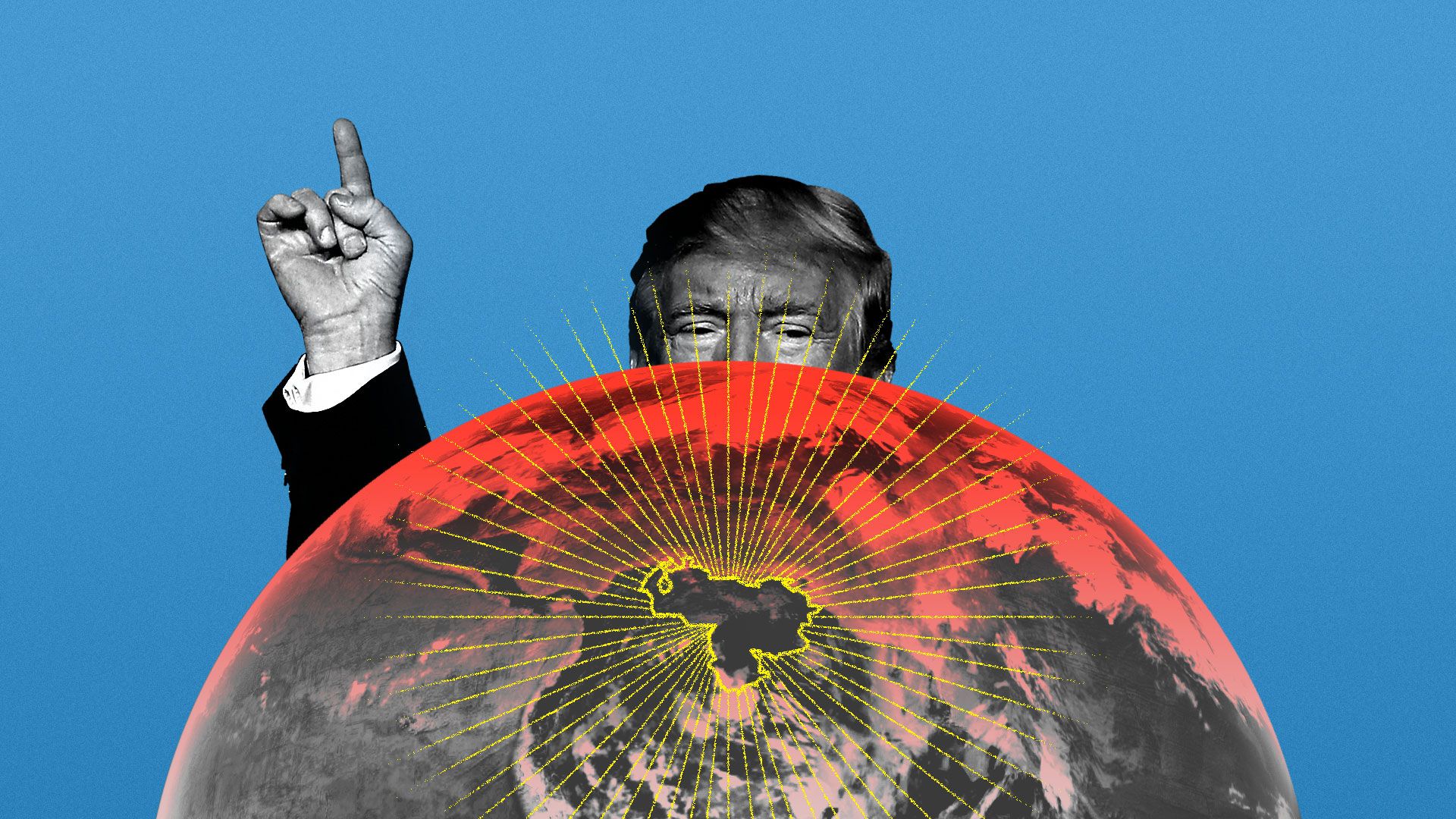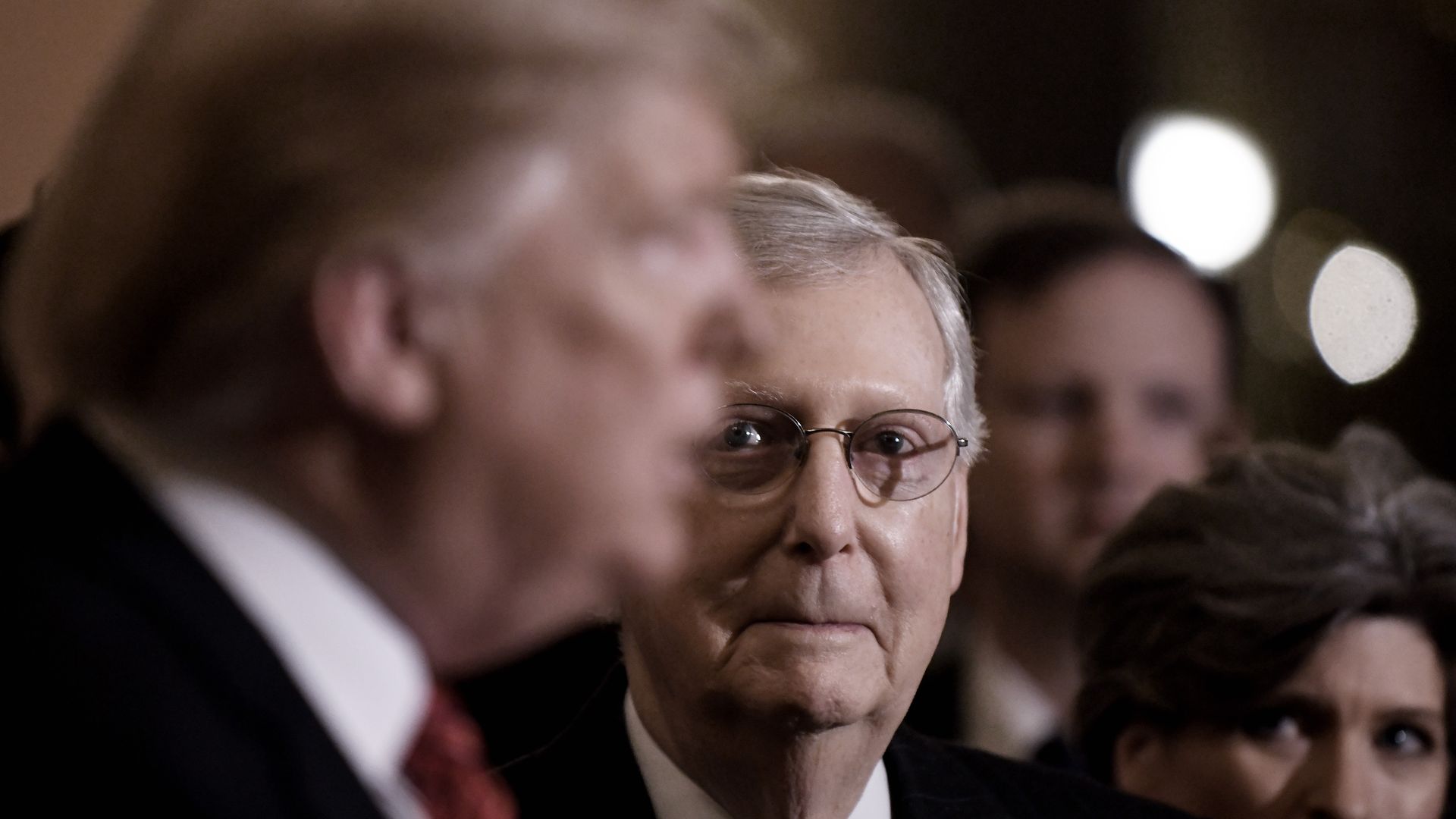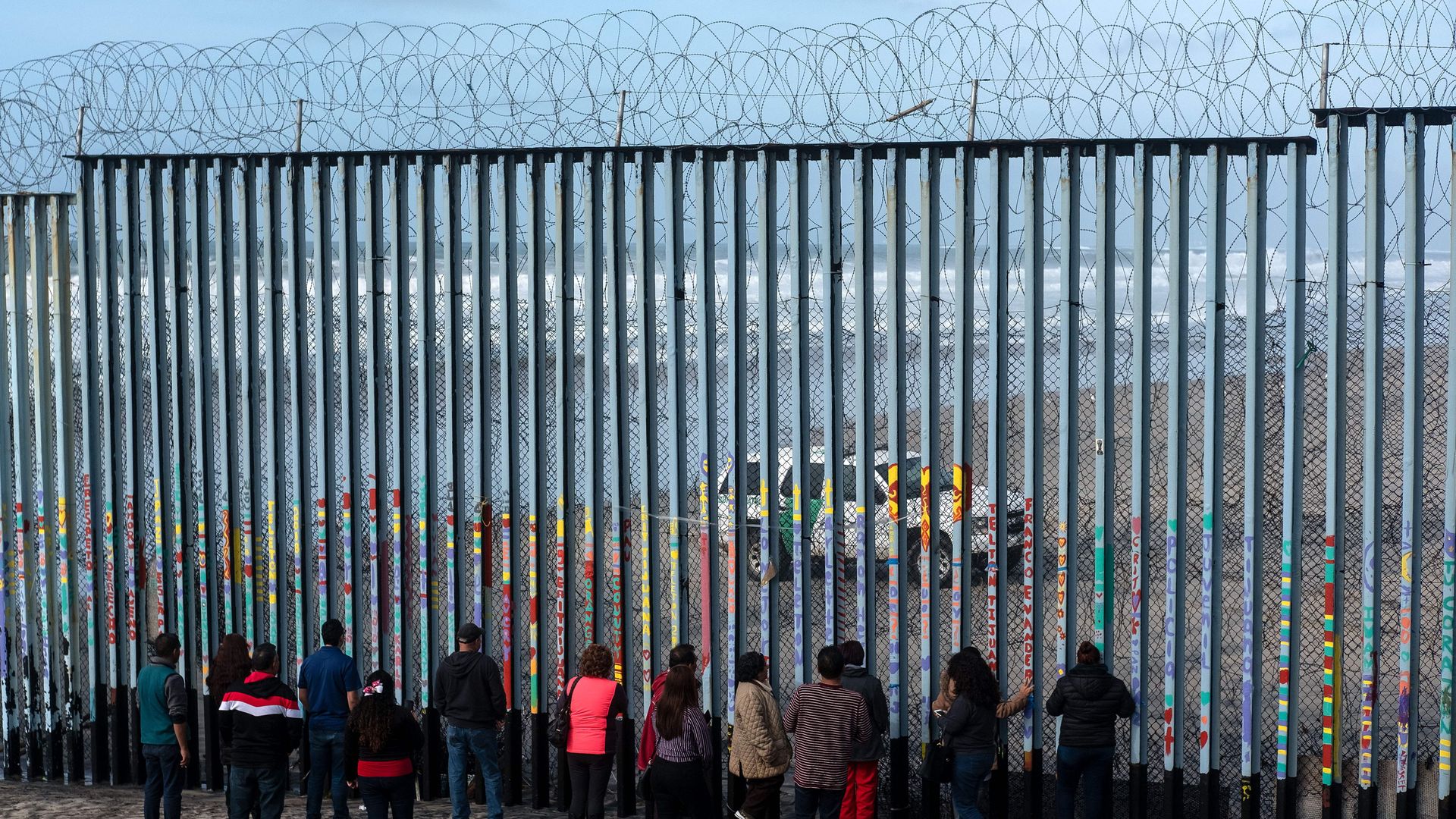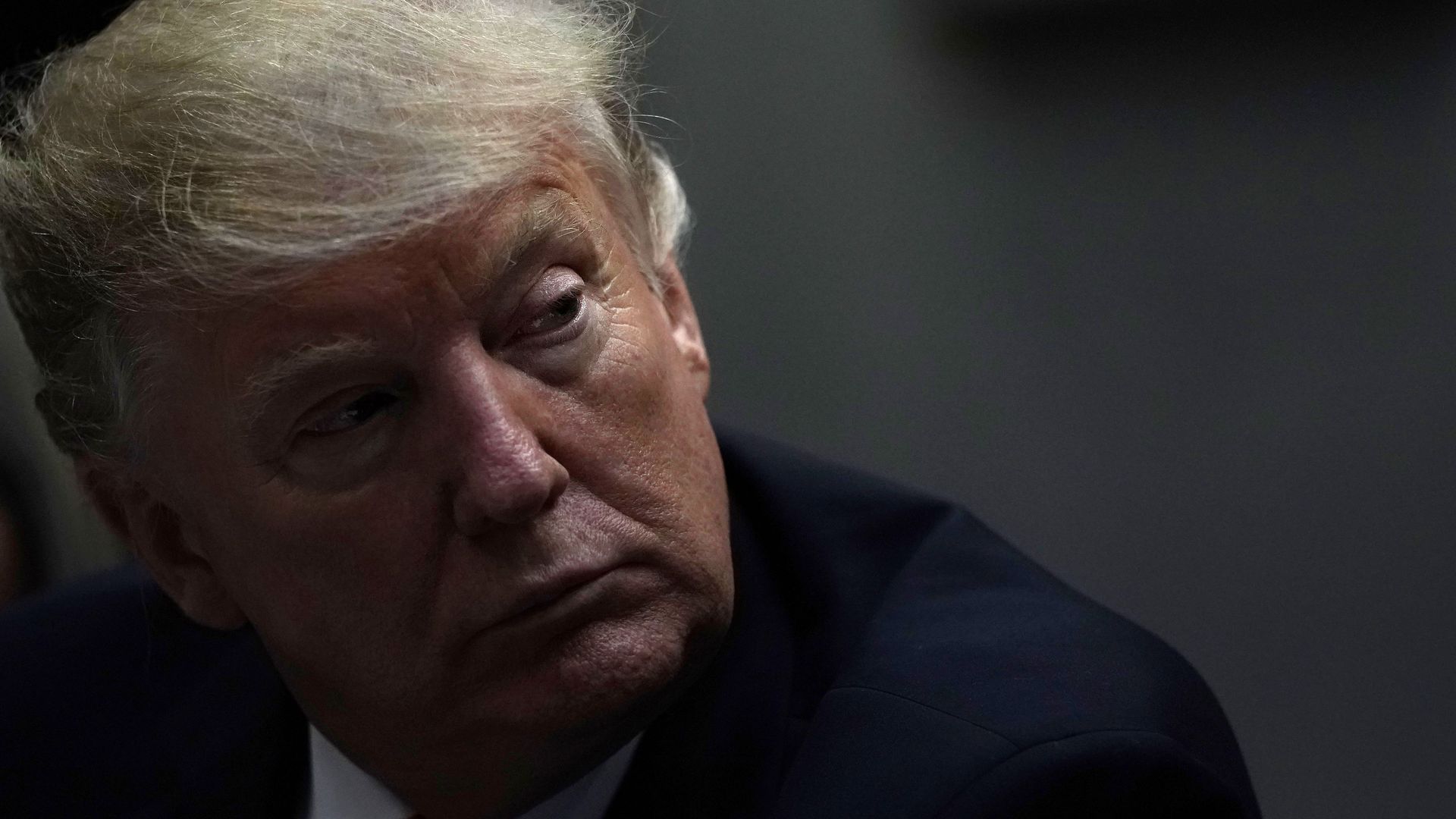January 28, 2019
Welcome to Sneak Peek, our weekly lookahead for both ends of Pennsylvania Avenue, plus my best scoops. Please encourage your friends and colleagues to sign up.
- Secure tips/leaks: [email protected] or email [email protected] for my Signal/Confide/WhatsApp #.
1 big thing: Scoop — Trump muses about "military option" in Venezuela

Illustration: Lazaro Gamio/Axios
Republican Sen. Lindsey Graham told me that as recently as a couple of weeks ago Trump mused to him about the possibility of using military force in Venezuela, where the U.S. government is currently pushing for regime change using diplomatic and economic pressures.
- Graham, recalling his conversation with Trump a couple weeks ago, said: "He [Trump] said, 'What do you think about using military force?' and I said, 'Well, you need to go slow on that, that could be problematic.' And he said, 'Well, I'm surprised, you want to invade everybody.'"
- Graham laughed. "And I said, 'I don't want to invade everybody, I only want to use the military when our national security interests are threatened.'"
"Trump's really hawkish" on Venezuela, the hawkish Graham added in a phone interview on Sunday afternoon, adding that Trump was even more hawkish than he was on Venezuela.
- To be clear: There are no signs that the Trump administration is planning to invade Venezuela, and my conversations with senior administration officials signal that the coming pressures to accelerate regime change are diplomatic and economic. (We expect the Trump administration will target Nicolás Maduro's oil and offshore wealth in the coming weeks and try to divert that wealth to the opposition leader, Juan Guaidó, whom Trump recognized last week as the interim President of Venezuela.)
- But that doesn't mean we should ignore Trump's private comments to Graham, because he's pointedly made clear that "all options" remain on the table and this isn't the first time Trump has mentioned military intervention in Venezuela. He's wanted to move aggressively against the Maduro regime since his first year as president. In the summer of 2017 Trump alarmed Venezuela with talk of a "military option." Trump's aides at the time talked him out of the idea.
The big picture: The Trump administration's approach to foreign policy has quietly but fundamentally changed. Gone are those who often fiercely disagreed with Trump's instincts: Jim Mattis, Rex Tillerson, Gary Cohn and, at times, H.R. McMaster. Trump's new senior team — John Bolton, Mike Pompeo and Acting Defense Secretary Patrick Shanahan — backs his instincts on almost every issue. (Though, again, there are no signs they are pushing him toward a military action in Venezuela.)
- We saw the new speed in Trump's foreign policy with his swift withdrawal from the Iran deal after Bolton took over as national security adviser, following months of slow-walking from Tillerson, Mattis and McMaster.
- And while it's still unclear how quickly Trump will withdraw U.S. troops from Syria — and to what extent a skeletal U.S. presence may remain — neither Bolton nor Pompeo treated the withdrawal as the red line that Mattis considered it.
Venezuela is another case study of the new speed of Trump's foreign policy. It's hard to say how the previous national security team would've reacted to January's events in Venezuela, but there were more voices of caution when the internal Venezuela debate raged in the first year of Trump's presidency.
- During the spring and summer of 2017, according to senior administration officials, the National Security Council worked with the State Department and the Pentagon to develop an "escalatory roadmap" to game out how the White House should react each time Maduro committed a new atrocity.
- According to a former senior official who was intimately involved, Maduro quickly crossed all the roadmap's red lines: His regime killed protesters, arrested opposition leaders and stripped the parliament of its legislative powers. By the logic of the roadmap — which the president approved — they ought to have imposed an oil embargo against Venezuela, according to the official.
- But Cohn, Trump's then-White House economic adviser, and Tillerson argued strongly against this, with Cohn saying it would roil markets, raise gas prices and exacerbate Venezuela’s humanitarian crisis. The result: no oil embargo.
The bottom line: Stymied at home, Trump is now moving faster than ever on foreign policy. Few, if any, in the White House believe Trump will accomplish much domestically in this Congress. But on foreign policy and national security — where he is most powerful — there are scant obstacles between what he wants and what he does.
2. "I know this isn't your favorite thing, Mitch": Inside a shambles

President Donald Trump talks to the press as Senate Majority Leader Mitch McConnell looks, Jan. 9. Photo: Olivier Douliery-Pool/Getty Images
On Friday morning, acting White House chief of staff Mick Mulvaney convened a small group of aides in his office to discuss their options to end the government shutdown. There weren't many. The previous day, Trump had been embarrassed on the Republican-controlled Senate floor, where Chuck Schumer's bill to open the government got more votes than his.
- One idea discussed there, which hasn't previously been reported, was to reopen the government with a three-week continuing resolution and if negotiations broke down during the three weeks, a one-year government funding extension would kick in. Trump didn't like the idea, according to a source with direct knowledge.
- Around 11 am, a senior White House official told me the internal planning was "too fluid" to report anything that would definitively still be true by 1:30 pm, when Trump was scheduled to make his announcement.
In short: Trump saw a Republican Senate poised to abandon him. Better to cave on his own terms, and in his own words, than watch both parties hang him out to dry.
"I can tell you exactly what happened,” one Republican senator texted me. “The mood at Senate Republican lunch on Thursday resembled what the mood must've been on the Union lines at 4pm at First Bull Run. I'm amazed only six [Republicans] voted for Schumer's bill. The message from that lunch by VP, Shahira [Knight] and Mitch [McConnell] to POTUS was, it's over. They'll be 70 votes within 48 hours."
- White House officials told me they knew their momentum was fading.
Behind the scenes: By the day of the vote — Thursday — Jared Kushner and the White House team had an accurate whip count and knew their proposal would go down, but colleagues were still stunned that Kushner was ever optimistic about Trump's offer of short-term relief for some undocumented immigrants in exchange for wall funding.
- On Thursday afternoon, McConnell and Trump had two important phone calls. In one mid-afternoon call, McConnell told Trump that Schumer had bluntly rejected Trump's "down-payment" idea for the wall. In that conversation, Trump still sounded resolute about not reopening the government, two sources familiar with the conversation told me.
- But by the two leaders’ second call, around 7 pm, Trump seemed to have decided he would end the shutdown.
Between the two calls, there were Oval Office meetings involving Mike Pence, Mulvaney and Kushner. They gave the president several options, and he realized there was no easy way out of his self-imposed mess. That evening, he vacillated between reopening the government with a clean funding bill and declaring a national emergency.
The bottom line: What happened was predictable, and it's exactly what McConnell told Trump would happen. In a December conversation, before the shutdown, McConnell warned Trump that shutdowns never end well and never provide more leverage to their instigators, according to a source briefed on the conversation.
- Throughout their phone calls over the past four weeks, Trump would sometimes say to McConnell: "I know this isn't your favorite thing, Mitch."
Go deeper: The NYT's Annie Karni and Maggie Haberman have a well-sourced piece on Jared Kushner's misplaced optimism about an immigration deal.
3. What's next on the wall showdown

People look at US border patrol guards through the US-Mexico border fence. Photo: Guillermo Arias/AFP/Getty Images
Trump has set a Feb. 15 deadline for a deal to get his wall money, and he's signaled he'll declare a national emergency or use other executive powers if he can't get the money through Congress.
- White House officials I've spoken to claim that House Democrats have privately signaled they're willing to fund a border barrier. (They won't say who.)
- But even these same White House officials aren't trying to spin that the "conference" to negotiate border security will yield a breakthrough. As the NYT's Jonathan Martin put it: "This is not, to put it mildly, a build-the-wall crew."
A congressional Republican aide, reflecting a widely shared view, texted this prediction: "Next three weeks will be just a messaging war. WH will use proxies to hammer why the border is a national emergency. Dems will use the time to take a victory lap. ... Most likely outcome — no wall money. POTUS uses it to justify a national emergency. Appropriations process blows up for many years."
Between the lines: By declaring a national emergency, Trump would trigger the ability for the White House to move money around that Congress controlled — including Army Corps civil works projects and military construction projects. Members regard these monies as lifelines for their districts or states; Congress protects them zealously.
4. New poll highlights Trump's resilience

Photo: Alex Wong/Getty Images
A reminder to anyone declaring the end-times of the Trump presidency, on the back of the shutdown: "President Trump’s standing among Americans remained effectively unchanged even as he presided over the longest partial government shutdown in U.S. history, the latest example of how his unusual brand of politics has resonated with a strong core of supporters," reports the Wall Street Journal's Michael Bender.
- "Mr. Trump’s approval rating was at 43% in a new Wall Street Journal/NBC News poll, with 54% disapproving of his job performance. That was the same mark as in a December survey taken 10 days before the start of the shutdown.
Yes, but: We don't have good data yet on how Trump's cave on Friday will affect his support. "The latest survey was conducted over a four-day period that ended Jan. 23, two days before Mr. Trump backed off his demand for border wall funding in what was widely viewed as a victory for congressional Democrats," per the WSJ.
5. Sneak Peek diary
The House will vote on the Federal Civilian Workforce Pay Raise Fairness Act of 2019, according to a leadership aide. The bill "would bring the 2019 pay increase for civilian federal employees in line with the raise given to members of the military."
The Senate will have another vote to proceed on the US-Israel Security Assistance Authorization Bill, according to a leadership aide. Per DefenseNews, Senate Democrats had previously blocked the procedural motion, "arguing the chamber should not consider any bills until it votes on House-passed legislation to end the partial government shutdown."
The White House did not provide a schedule for President Trump.
6. 1 fun thing: Cohn offers Trump to Brits

Illustration: Lazaro Gamio/Axios
On Wednesday night, top Goldman Sachs executives gathered business and political leaders for their big client dinner at the Central Sporthotel in Davos, Switzerland.
Gary Cohn, the former Goldman Sachs president and former top White House economic adviser, addressed the group, telling them that globalization had caused "a lot of tension in the world." According to two sources in the room, Cohn turned to Chancellor of the Exchequer Philip Hammond and made a tongue-in-cheek offer.
"Chancellor," Cohn said, according to one of those sources, "you've got your issues and we've got our issues. But we do have this guy in America who's supposed to be the world's best negotiator. In fact he wrote the book 'The Art of the Deal.' Maybe if we sent him over to you it could help you, and it could be helpful for us too."
Cohn declined to comment for this item.